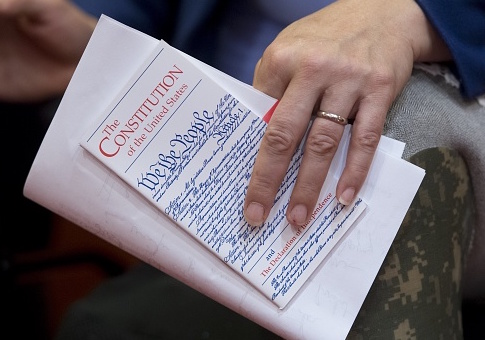A public university has been accused of abandoning its First Amendment responsibilities after an artist's anti-Trump submission to an art show was rejected for being "too controversial."
Polk State College rejected artist and adjunct visual arts professor Serhat Tanyolacar's "Death of Innocence" for a faculty art show this month, citing guidelines utilized by the gallery committee that were not originally listed in the submission invitation and have yet to be fully enumerated publicly or in private correspondence with Tanyolacar.
The piece considers modern morality through a juxtaposition of pornographic images of President Donald Trump and Russian President Vladimir Putin—"the world as it is," in Tanyolacar's words—with "the world as we could be," featuring artists, poets, and writers.
The aspirational section includes figures who have lately come under attack at other schools as offensive, from playwright Bertolt Brecht to Atticus Finch of To Kill a Mockingbird.
In an email exchange between Tanyolacar and show coordinator Nancy Lozell regarding the piece, Lozell suggested that it was rejected for its content, and in part due to the disturbance it might cause high school students who may visit campus.
Tanyolacar called it ironic for a college to censor art that is meant to parody the actual behavior and rhetoric of a president who has been repeatedly publicly exposed as making degraded comments about women and minorities.
The National Coalition Against Censorship and the Foundation for Individual Rights in Education wrote last week to Polk State President Angela Garcia Falconetti insisting Tanyolacar's piece be reconsidered for inclusion in a viewpoint-neutral manner.
"Polk State harms members of the college community by needlessly childproofing their campus, and high school students by underestimating their ability to cope with contentious or provocative artwork," said FIRE Senior Program Officer Sarah McLaughlin.
Tanyolacar has since spoken with Falconetti, interim vice president of academic affairs Donald Painter, Jr., and professor of art Holly Scoggins, in a Friday meeting at which Tanyolacar said administrators reaffirmed that his piece would not be included in the exhibit.
"They are scared of something, I can only speculate what," he said. "The most hurtful part is that this is coming from the arts faculty, who should support controversy."
An immigrant from Turkey, Tanyolacar lamented that he has repeatedly found in this country a disregard for the constitutional right to free expression he specifically came to the United States to enjoy. Indeed, while a visiting professor at the University of Iowa in 2014, his piece on race in America was removed from a show due to his subversive use of Ku Klux Klan imagery.
"People are not aware of it [right to free speech], until it's under threat," Tanyolacar said. "Until you experience personally that you should have rights but don't, or can't use them, you don't know how important they are. I'm way more sensitive because of my earlier life, where I had no free speech, where we had no open political discourse. This country should be different."
Tanyolacar said that this incident sealed his decision not to return next year to Polk State.
"I need to find the right place for me, where liberals and conservatives don't think about political difference but about the dialogues we can create," he said, adding, "The so-called 'controversy' of my work is proof that I'm on the right track in using and promoting First Amendment rights."
Polk State and Lozell did not respond to requests for comment regarding their views on art censorship.
